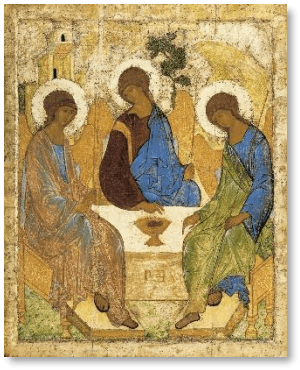The Holy God as Trinity
The concept of God as Triune is nowhere explicated in the New Testament, because the New Testament is not a handbook of systematic theology, but a collection of memoirs and letters. Nonetheless, the ingredients of the apostolic teachings which would later be combined into a coherent whole in the doctrine of the Trinity are all there.
These are: the teaching that the Father, the Son, and the Holy Spirit are distinct from one another; that all three are divine, and that there is only one God. The doctrine of the Holy Trinity as taught by the Church is simply the result of gathering these separate teachings into a single consistent whole.
The doctrine of the Holy Trinity as taught by the Church is simply the result of gathering these separate teachings into a single consistent whole.
We can see this adumbrated in the baptismal formula Christ gave His Church when He commanded that they baptize converts in the name (note the singular) of the Father, the Son, and the Holy Spirit (Matt 28:19). These three would hardly have been gathered together under one head and in one name unless all three had been equal and divine.
In the earliest days of the Church the combination of these teachings into a doctrine of God as three and one was pastorally unnecessary. The Church knew that Jesus of Nazareth was God (compare St. Ignatius of Antioch’s reference to him as “Jesus Christ our God” in his letter to the Ephesians1), and yet still confessed a belief in one God. It was only when some within the Church began to produce erroneous understandings of the relationship between Father, Son, and Holy Spirit that a more systematic presentation became necessary. The Church is a fellowship of worshippers, not of analysts; it only undertakes examination of such complex questions when compelled by the necessity of refuting error.
The doctrine of the Holy Trinity has an experiential aspect. We find God the Father above us in heaven, ruling the cosmos and receiving our prayers. We find God the Son in our midst, offering mankind union with Himself through baptism, and so also union with his Father with whom He is one. We experience God the Spirit within our hearts. The Holy Trinity is not an abstract doctrine; it is the constant and saving experience of the Church.
Footnotes
-
St. Ignatius, Letter to the Ephesians, the greeting. ↩